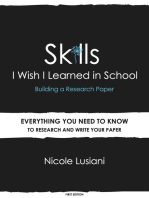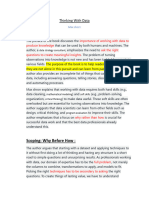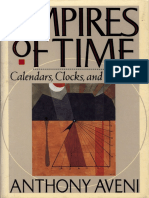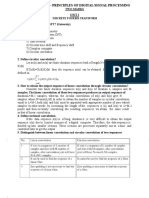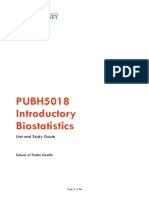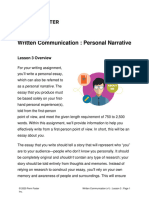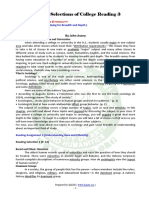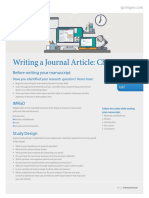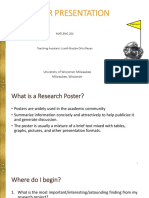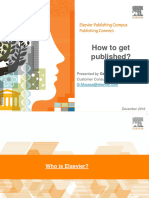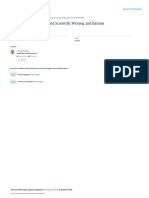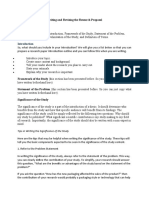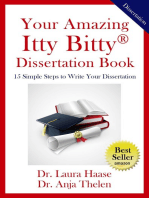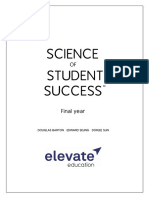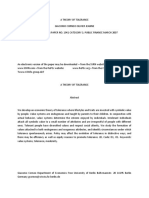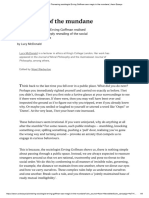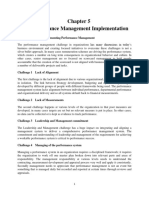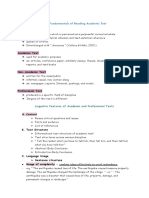How To Read A Research Paper
Uploaded by
Hena AfridiHow To Read A Research Paper
Uploaded by
Hena AfridiHOW TO READ A
RESEARCH PAPER
CΔJUN KOI ACADEMY
Hello. I'm Misty, your
friendly A.I. at Cajun Koi
Academy.
In today's module, we will cover how
to read a research paper...
Scientific writing is DRY, and can be
difficult to get through.
So before committing to a
paper, first ask yourself
why are you even reading it?
3 Reasons why you might
be reading:
1. You're trying to
stay updated on
the latest
research.
2. You're doing
research for your
own publication.
3. You are reading
an assignment, or
for school.
The universal approach is similar,
but each scenario has it's key
points to look out for:
Scenario #1 -
Staying updated
Consider if the findings
in the paper are
applicable to your life.
Will it change the way
you do things?
(i.e. If a doctor is reading
about a new drug,
should this drug replace
the old one that has
been prescribed for
years?)
Scenario #2 - Your own research
Be on the look out for whether the
authors of the paper asked the
questions that you wanted answered.
(i.e. is this article relevant enough to
be referenced in my own publication?
Scenario #3 - An assignment
Consider how the study was designed
and if the results were measured in a
valid way.
(i.e. are there limitations or are there
other factors that may have affected
the results?)
Typical organization of a
research paper:
Title
Abstract
Introduction
Methods
Results
Discussion
Conclusions
References
Don't read
in order!
Start with the Title and
Abstract. Try to
identify these 3 major
points and write them
down:
1. the hypothesis
2. the conclusion
3. the statistical
significance of the
results (check the p-value &
confidence intervals)
After that, go straight to the
Conclusion. (The Abstract
summarizes the entire paper,
and the Conclusion summarizes
all the important findings.)
Once you have a good idea of
what the paper is about, you
must now decide:
Is this paper worth reading or
should I drop it?
Now it's time to begin
reading from top to bottom.
As you read, take notes in the
margins using basic
language. Don't force
yourself to relearn the info
later.
If you come across new key
terms you aren't familiar with,
make sure to look them up
before moving on. (sometimes
they provide a glossary as well).
How to Take Notes
Let's talk about each section
individually. Your notes should
answer these questions from
every section:
Introduction Why was the
research done?
What is the
hypothesis
important?
How did they
test the
hypothesis?
Methods
What type of How many
study was it subjects?
(retro or Where did it
prospective? take place? For
randomized? how long?
What was the How was the
inclusion data collected?
criteria?
What were the
endpoints?
What kind of
statistical
analyses were
done?
Limitations
Before going through the
Results section, find the
limitations of the study, which
are usually in the Discussion.
Limitations help us determine
how significant or how useful
the results can be.
Was the study Was the study
appropriately industry-
powered? sponsored?
Did any subjects Were the
drop out? why? researchers
Was there long sponsored as
term follow-up well?
for the subjects?
Results Did the study
meet statistical
significance?
Can we
generalize the
results to real
life?
Discussion
This is the author's
interpretation of the results.
Spend the most time in this
section. We want to analyze how
useful or valid the results are...
How valid
is the data?
Was the Randomized?
study well Blinded?
designed? Controlled?
Selection?
Was there Lead time?
bias? Confounding?
Hawthorne effect
What was Were the
the author's endpoints good
explanation proxies?
for the Was there a causal
results? effect?
correlation causation
How to stay
Organized
If you have to read through many
articles and compile them for
writing your own research paper,
then be sure to use a citation
manager to stash your sources.
Here are some examples below:
Practice!
The more familiar you are with
the subject you're reading, the
more efficiently you will be able
to get through more papers. Over
time, you will gain more reading
fluency as your knowledge in
your specific field grows. The
more you read, the easier it gets!
We have more tools and
resources for all your
student needs.
Why not visit the academy campus
and take the Brain Type Test?
Discover your ideal study style and
match into one of the 3 clubs:
www.cajunkoiacademy.com/orientation
TORA KITSUNE KUMA
CLUB CLUB CLUB
You might also like
- Study Skills for Nursing and Healthcare Students 1st Edition by Pat Maier 9780273749783 0273749781 - Download the ebook now to start reading without waitingNo ratings yetStudy Skills for Nursing and Healthcare Students 1st Edition by Pat Maier 9780273749783 0273749781 - Download the ebook now to start reading without waiting31 pages
- The Student's Guide To Social Neuroscience 2nd Edition Jamie Ward All Chapter Instant Download100% (5)The Student's Guide To Social Neuroscience 2nd Edition Jamie Ward All Chapter Instant Download52 pages
- Full Download Handbook of Embodied Psychology: Thinking, Feeling, and Acting PDF100% (1)Full Download Handbook of Embodied Psychology: Thinking, Feeling, and Acting PDF79 pages
- Skills I Wish I Learned in School: Building a Research Paper: Everything You Need to Know to Research and Write Your PaperFrom EverandSkills I Wish I Learned in School: Building a Research Paper: Everything You Need to Know to Research and Write Your PaperNo ratings yet
- Preparing Literature Reviews Qualitative and Quantitative ApproachesNo ratings yetPreparing Literature Reviews Qualitative and Quantitative Approaches4 pages
- Aveni Anthony F Empires of Time Calendars Clocks and Culture PDF100% (1)Aveni Anthony F Empires of Time Calendars Clocks and Culture PDF383 pages
- 1-Deshpande-Scientific Writing and CommunicationNo ratings yet1-Deshpande-Scientific Writing and Communication36 pages
- Community Engagement, Solidarity and Citizenship: Detailed Lesson Plan Grade 12 Quarter 4100% (2)Community Engagement, Solidarity and Citizenship: Detailed Lesson Plan Grade 12 Quarter 44 pages
- Pre-Professional Skills Test (PPST) or Praxis I Test Study GuideNo ratings yetPre-Professional Skills Test (PPST) or Praxis I Test Study Guide20 pages
- New Dimensions in Spirituality - Religion - and - AgingNo ratings yetNew Dimensions in Spirituality - Religion - and - Aging60 pages
- Instant Download Questionnaire Research A Practical Guide 4th Edition Mildred Patten PDF All Chapters100% (2)Instant Download Questionnaire Research A Practical Guide 4th Edition Mildred Patten PDF All Chapters81 pages
- English 101C: First Year Composition Spring 2011: Abright@grandview - EduNo ratings yetEnglish 101C: First Year Composition Spring 2011: Abright@grandview - Edu11 pages
- Research Methods in Human-Computer Interaction Por Jonathan Lazar, Jinjuan Heidi Feng, Harry PDF0% (1)Research Methods in Human-Computer Interaction Por Jonathan Lazar, Jinjuan Heidi Feng, Harry PDF53 pages
- Quantitative Data Analysis - Doing Social Research To Test Ideas (Research Methods For The Social Sciences) (PDFDrive)No ratings yetQuantitative Data Analysis - Doing Social Research To Test Ideas (Research Methods For The Social Sciences) (PDFDrive)448 pages
- A Step by Step Guide To Writing A Scientific Manuscript100% (3)A Step by Step Guide To Writing A Scientific Manuscript18 pages
- Download Complete Advanced R Statistical Programming and Data Models: Analysis, Machine Learning, and Visualization 1st Edition Matt Wiley PDF for All Chapters100% (9)Download Complete Advanced R Statistical Programming and Data Models: Analysis, Machine Learning, and Visualization 1st Edition Matt Wiley PDF for All Chapters55 pages
- Penn Foster Written Communication Exam GuidelinesNo ratings yetPenn Foster Written Communication Exam Guidelines36 pages
- How To Write A Great Research Paper and Get Published PDFNo ratings yetHow To Write A Great Research Paper and Get Published PDF78 pages
- Presentation Dos and Don'ts TIPS FOR PREPARING GREAT SLIDES50% (2)Presentation Dos and Don'ts TIPS FOR PREPARING GREAT SLIDES8 pages
- Full download Doing a Systematic Review A Student s Guide 2nd ed 2nd Edition Angela Boland pdf docx100% (1)Full download Doing a Systematic Review A Student s Guide 2nd ed 2nd Edition Angela Boland pdf docx47 pages
- Academic Word List (Book 2) Advanced PracticeNo ratings yetAcademic Word List (Book 2) Advanced Practice49 pages
- Molecular Histopathology and Tissue Biomarkers in Drug and Diagnostic DevelopmentNo ratings yetMolecular Histopathology and Tissue Biomarkers in Drug and Diagnostic Development395 pages
- How to Use Your Reading in Your Essays 3rd Edition Jeanne Godfrey download100% (2)How to Use Your Reading in Your Essays 3rd Edition Jeanne Godfrey download55 pages
- The Sociology of Aging: Understanding The Aging Process and Its Impact On SocietyNo ratings yetThe Sociology of Aging: Understanding The Aging Process and Its Impact On Society6 pages
- Writing Your Psychology Research Paper Scott Baldwin Ebook All Chapters PDF100% (1)Writing Your Psychology Research Paper Scott Baldwin Ebook All Chapters PDF69 pages
- C. George Thomas 2021 Research Methodology and Scientific Writing. 2nd Edition.No ratings yetC. George Thomas 2021 Research Methodology and Scientific Writing. 2nd Edition.14 pages
- Research Methodology: NOVEMBER 26, 2010No ratings yetResearch Methodology: NOVEMBER 26, 2010136 pages
- Developing Skills in Scientific Writing (John Giba)No ratings yetDeveloping Skills in Scientific Writing (John Giba)201 pages
- Amplifying Research Visibility and ImpactNo ratings yetAmplifying Research Visibility and Impact78 pages
- KIPS Entry Test Series - Biology - 7th Edition100% (4)KIPS Entry Test Series - Biology - 7th Edition448 pages
- Linguistic Ideologies in Fiction PodcastsNo ratings yetLinguistic Ideologies in Fiction Podcasts54 pages
- The New Behaviorism Foundations of Behavioral Science 3rd Edition John Staddon all chapter instant download100% (3)The New Behaviorism Foundations of Behavioral Science 3rd Edition John Staddon all chapter instant download65 pages
- MODULE-6 Human Person As Embodied SpiritNo ratings yetMODULE-6 Human Person As Embodied Spirit18 pages
- Social psychology Eighth Edition Aronson - The ebook is available for instant download, read anywhereNo ratings yetSocial psychology Eighth Edition Aronson - The ebook is available for instant download, read anywhere47 pages
- Udemy - Spiritual Coach Certification (Accredited)No ratings yetUdemy - Spiritual Coach Certification (Accredited)18 pages
- The Influence of OCB (Organizational Citizenship Behavior) On The Lecturer's Organizational Pride (A Study at University of Nahdlatul Ulama Surabaya)No ratings yetThe Influence of OCB (Organizational Citizenship Behavior) On The Lecturer's Organizational Pride (A Study at University of Nahdlatul Ulama Surabaya)5 pages
- Deleuze and Design by Betti Marenko, Jamie Brassett100% (1)Deleuze and Design by Betti Marenko, Jamie Brassett264 pages
- 11.03 Sociological Perspectives On Gender StratificationNo ratings yet11.03 Sociological Perspectives On Gender Stratification5 pages
- Chapter 5 - Performance Management ImplementationNo ratings yetChapter 5 - Performance Management Implementation22 pages
- Growth of Anthropology in India Nics 2023 AprNo ratings yetGrowth of Anthropology in India Nics 2023 Apr21 pages
- Language and Linguistics Solved MCQs (Set-1)100% (1)Language and Linguistics Solved MCQs (Set-1)6 pages




